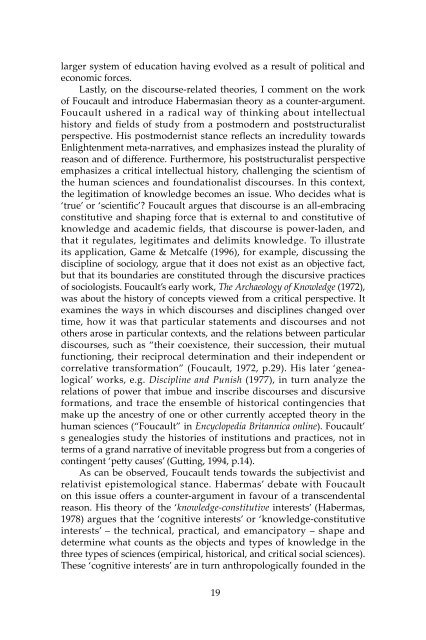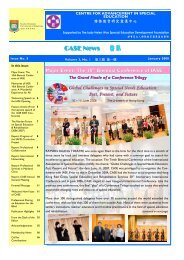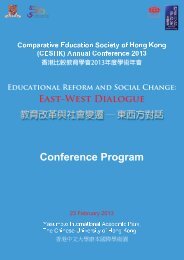Comparative Education Bulletin - Faculty of Education - The ...
Comparative Education Bulletin - Faculty of Education - The ...
Comparative Education Bulletin - Faculty of Education - The ...
You also want an ePaper? Increase the reach of your titles
YUMPU automatically turns print PDFs into web optimized ePapers that Google loves.
larger system <strong>of</strong> education having evolved as a result <strong>of</strong> political and<br />
economic forces.<br />
Lastly, on the discourse-related theories, I comment on the work<br />
<strong>of</strong> Foucault and introduce Habermasian theory as a counter-argument.<br />
Foucault ushered in a radical way <strong>of</strong> thinking about intellectual<br />
history and fields <strong>of</strong> study from a postmodern and poststructuralist<br />
perspective. His postmodernist stance reflects an incredulity towards<br />
Enlightenment meta-narratives, and emphasizes instead the plurality <strong>of</strong><br />
reason and <strong>of</strong> difference. Furthermore, his poststructuralist perspective<br />
emphasizes a critical intellectual history, challenging the scientism <strong>of</strong><br />
the human sciences and foundationalist discourses. In this context,<br />
the legitimation <strong>of</strong> knowledge becomes an issue. Who decides what is<br />
‘true’ or ‘scientific’? Foucault argues that discourse is an all-embracing<br />
constitutive and shaping force that is external to and constitutive <strong>of</strong><br />
knowledge and academic fields, that discourse is power-laden, and<br />
that it regulates, legitimates and delimits knowledge. To illustrate<br />
its application, Game & Metcalfe (1996), for example, discussing the<br />
discipline <strong>of</strong> sociology, argue that it does not exist as an objective fact,<br />
but that its boundaries are constituted through the discursive practices<br />
<strong>of</strong> sociologists. Foucault’s early work, <strong>The</strong> Archaeology <strong>of</strong> Knowledge (1972),<br />
was about the history <strong>of</strong> concepts viewed from a critical perspective. It<br />
examines the ways in which discourses and disciplines changed over<br />
time, how it was that particular statements and discourses and not<br />
others arose in particular contexts, and the relations between particular<br />
discourses, such as “their coexistence, their succession, their mutual<br />
functioning, their reciprocal determination and their independent or<br />
correlative transformation” (Foucault, 1972, p.29). His later ‘genealogical’<br />
works, e.g. Discipline and Punish (1977), in turn analyze the<br />
relations <strong>of</strong> power that imbue and inscribe discourses and discursive<br />
formations, and trace the ensemble <strong>of</strong> historical contingencies that<br />
make up the ancestry <strong>of</strong> one or other currently accepted theory in the<br />
human sciences (“Foucault” in Encyclopedia Britannica online). Foucault’<br />
s genealogies study the histories <strong>of</strong> institutions and practices, not in<br />
terms <strong>of</strong> a grand narrative <strong>of</strong> inevitable progress but from a congeries <strong>of</strong><br />
contingent ‘petty causes’ (Gutting, 1994, p.14).<br />
As can be observed, Foucault tends towards the subjectivist and<br />
relativist epistemological stance. Habermas’ debate with Foucault<br />
on this issue <strong>of</strong>fers a counter-argument in favour <strong>of</strong> a transcendental<br />
reason. His theory <strong>of</strong> the ‘knowledge-constitutive interests’ (Habermas,<br />
1978) argues that the ‘cognitive interests’ or ‘knowledge-constitutive<br />
interests’ – the technical, practical, and emancipatory – shape and<br />
determine what counts as the objects and types <strong>of</strong> knowledge in the<br />
three types <strong>of</strong> sciences (empirical, historical, and critical social sciences).<br />
<strong>The</strong>se ‘cognitive interests’ are in turn anthropologically founded in the<br />
19
















